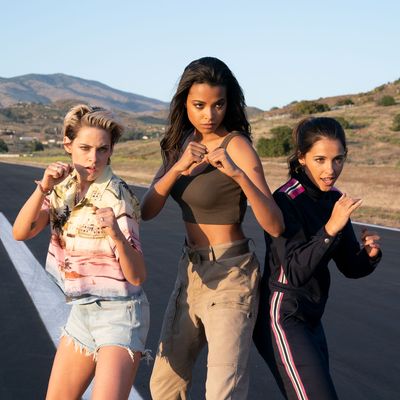
You could chart a mini arc of corporate feminism onto the Charlie’s Angels franchise. When it premiered in its original form on ABC in 1976, it was a marshmallow-light Aaron Spelling creation that proved to resistant network heads that audiences really would show up for a women-led hour-long series — especially if those women went scantily clad and braless (a rival exec decried it as “jiggle television”). In 2000, the show was adapted into a movie that didn’t subvert the more retrograde sensibilities of its source material so much as it transformed them into the stuff of comedy, helped along by the appeal of a giggling, drop-kicking Drew Barrymore, Cameron Diaz, and Lucy Liu. It was still written and directed by men, though Marianne Wibberley would join as a screenwriter on the 2003 sequel that pushed the tenuous charms of the first film past their breaking point.
There was a disastrous video game in there somewhere, and a short-lived second TV series in 2011. And now, because nothing ever goes away anymore, the Angels are back on the big screen, and in true 2019 fashion, they’ve been given a girl-power makeover so desultory that you could fill out a bingo card with it. A man tells one of the main characters to smile (he dies!). Supreme Court Justice Ruth Bader Ginsburg is declared to have secretly been an Angel this whole time (I died). Kristen Stewart kicks the film off by declaring to the camera that “I think women can do anything,” a sentiment that, like the random montage of women around the world doing things that follows shortly after, is not actually explored beyond its potential to be stuck on a T-shirt. The basic idea of Charlie’s Angels remains the same — three women fight crime as part of a private organization owned by the mysterious figure of the title, one who’s only ever heard on speakerphone. But what’s so depressing about the new film is that the most radical thing it can think to do to update this concept is to hint that Charlie has actually, this whole time, been a lady.
Charlie’s Angels is directed by Elizabeth Banks in her second turn behind the camera — she also appears in a supporting role as the foremost of the film’s many Bosleys (the Townsend Agency has gone global). She’s not a natural with action. The film’s big setpieces are all chopped to bits, then edited together in a way that doesn’t line up smoothly enough to give a sense of fluid motion, to blur the line between stunt double and actor, or to give you a sense of where all these bodies are in relationship to one another. That’d be more forgivable if the other scenes had snap, but the screenplay, which Banks wrote from a story by Evan Spiliotopoulos and David Auburn, has a tendency to end on lines that you only realize are supposed to have impact or humor when the movie then cuts away to something else. “Are we on a boat?” Naomi Scott groggily asks in one sequence, after waking up from being drugged. “Yeah,” Stewart replies. The music swells, and the camera pulls out to reveal that they are indeed on a boat — scene!
Stewart, as the loosey-goosey Sabina, and relative newcomer Ella Balinska, as the no-nonsense Jane, are the established Angels, while Scott, most recently seen in Aladdin, is an engineer named Elena that they’re assigned to protect. Elena works at a company poised to unveil a pocket-sized source of clean energy that can also, inconveniently, be weaponized, something neither her condescending boss (Nat Faxon) nor their visionary CEO (Sam Claflin) wants to hear. When she attempts to blow the whistle, an assassin (Jonathan Tucker) comes after her, seemingly already informed of her whereabouts. There are betrayals, and disguises, and a choreographed dance number, but there’s a shocking dearth of pleasure in what should be a movie that’s mainly about it. Only every once in a while does it manage that kind of indulgent effervescence — like when the head of the Angels’ Berlin base, when giving them a tour, reveals himself to be a combination chiropractor, chef, and licensed psychotherapist.
Or when Stewart is on screen. Where the last two Charlie’s Angels installments were sold on their trio of stars, this soft reboot has leads at various levels of recognizability, and they all seem to be acting in their own movie. Balinska, with her striking athleticism and stern demeanor, is in a thriller, and Scott, with her cartoonishly big expressions, is in a screwball comedy, and neither is especially well-served by these tonal choices. It’s only Stewart, whose line readings are wildly counterintuitive, who finds a rhythm that works. She plays her character as a crypto-queer, filter-free goofball, and it’s wonderfully weird. It’s not clear if Stewart has, or wants, a future in broad action-adventures like this, but she’s the only person in the movie who actually comes across as having a good time — and how empowering is that?


